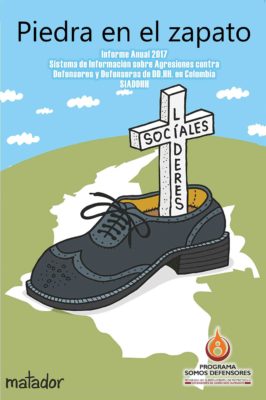Source APHR – ASEAN Parliamentarians for Human Rights
JAKARTA, 12 March 2018 — Regional MPs today condemned the killing of indigenous, environmental activist Ricardo Pugong Mayumi in the Philippines earlier this month and called for a prompt and thorough investigation into his murder.
ASEAN Parliamentarians for Human Rights (APHR) said the killing highlights the increasingly hostile climate faced by activists in the Philippines, and reflects broader regional and global trends that have seen a rising tide of threats and violence against land and environmental rights defenders.
APHR also urged the Philippine government, along with all ASEAN member governments, to do more to promote and protect the rights of indigenous communities. “This case is emblematic of the grave dangers faced by Filipinos, particularly those from indigenous communities, who choose to exercise their fundamental rights as they seek to protect their land, natural resources, and livelihoods. We urge the relevant authorities in the Philippines to undertake a full investigation and bring perpetrators to account. Justice must be served,” said APHR Board Member Eva Kusuma Sundari, a member of the Indonesian House of Representatives.
Mayumi, an indigenous person and environmental rights defender, was shot dead on 2 March at his home in Ifugao province in the Philippines. As a leader of the Ifugao Peasant Movement (IPM), he had been involved in organizing opposition to a major hydropower project planned for the area. He and other IPM members reportedly had been receiving death threats since at least 2012. Parliamentarians noted that Mayumi’s case is only one of a large number of similar killings. The Philippines has been the deadliest country in Asia for land and environmental rights defenders in the past three years, according to statistics from the NGO Global Witness, and 2017 alone saw 41 of them killed in the country, out of a total of nearly 200 murdered globally.
Hundreds more have faced judicial harassment, intimidation, and threats, including from top government officials. “It’s dangerous to be an environmental rights defender anywhere in the world these days, but especially in the Philippines, where large corporations are increasingly trampling on community lands and livelihoods, and impunity too often reigns. It is also deeply distressing that the government appears actively hostile to the idea of protecting human rights defenders,” Sundari said.
In a related development, MPs also expressed concern about the inclusion of UN Special Rapporteur on the rights of indigenous peoples, Victoria Tauli-Corpuz, along with other indigenous activists from the Philippines, on a list of alleged members of the Communist Party of the Philippines (CPP) and its armed wing, the New People’s Army (NPA), following the recent submission by the Justice Department of a petition to list these entities as “terrorist organizations.” “This is a deeply dangerous move by the government. In a context where indigenous people put their lives on the line each and every day to defend their rights, labeling them as ‘terrorists’ adds insult to injury and further undermines their security and basic rights,” said APHR Board Member Walden Bello, a former Philippine Congressman.
APHR noted that the problem of impunity for similar attacks also extends beyond the Philippines, with indigenous and environmental activists killed, imprisoned, and threatened across the ASEAN region. In Cambodia, for instance, three people, including conservation workers, were shot dead after confronting illegal loggers in January. Last year also saw the extra-judicial killing of an indigenous activist in Thailand, an incident which has yet to be properly investigated, despite calls from APHR and other groups.
In addition, pursuing justice in cases where powerful individuals are caught undermining environmental protection efforts is often an uphill battle, APHR said, highlighting the recent case of a construction company mogul in Thailand caught poaching in a wildlife sanctuary. “These corporate elites see the environment as a poaching ground. As ASEAN integration proceeds apace, we must work as a region to make sure that the benefits do not accrue only to the elite and corporations, but also to people at the grassroots.
Safeguards are needed to ensure that local communities do not continue to be victimized and attacked for demanding their rights,” Bello said. “Lawmakers have a duty to help put such safeguards in place. Multinational corporations, which all too often are connected to these incidents, need to take responsibility as well,” he added.
Contact: Phone: +66 99 278 7334 Email: oren@aseanmp.org
